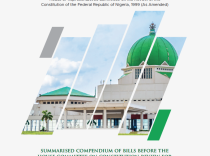A Bill seeking to confer Residency Rights for any Nigerian citizen who has paid taxes to the Local Government Area he has been residing in for at least 5 years has scaled second reading in Senate (SB356).
Leading the debate on the Bill at the plenary session of Wednesday, 31 January 2018, Sen. Dino Melaye (APC: Kogi), stated that the Bill sought to provide residency rights for Nigerian citizens who had paid taxes to the Local Government Area where he resides for a period not less than 5 consecutive years. The Bill also seeks to confer a residence status to the child of such a person that has lived with him for the same period and is under the age of eighteen.
Sen. Melaye in his submission explained that the Bill if passed, would allow citizens to contest elections in areas they have resided for more than 5 years, provide for States of Residency rather than State of Origin and address citizen access to resources and the perennial problem of indigeneship. He also decried the present situation that prevented some Nigerians from being accorded symbolic recognition in communities that they have lived in for a long time and where their taxes have been paid because it was not their State of origin.
Sen. Melaye also expressed dismay over the discrimination meted out by some States against women in preventing them from accessing certain entitlements and benefits when they claimed indigeneship by marriage. He stated that the Federal Character Commission’s administrative regulations regard women as solely belonging to their Local Government of Birth and did not include marriage. He noted that the Bill could address this defect since it intended to expand the definition of citizenship to include the proposed residency principle and long-term residents.
The Bill has been referred to the Committee on Judiciary, Human Rights and Legal Matters to report back in 4 weeks.





